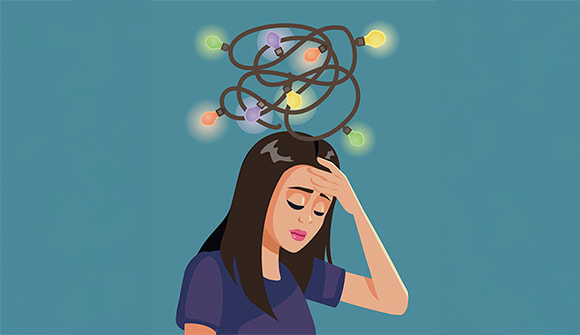Unfinished business
Subtle signs of ADHD in women.
Article Author: Wesley Roberts
Article Date:

You don’t have to be restless to have attention deficit hyperactivity disorder (ADHD). While boys and men with ADHD often do have signs of hyperactivity, that’s not always the case for women, explained De’Von Patterson, PhD, a psychologist with Baptist Behavioral Health.
“Women with ADHD may experience symptoms that are internal and harder to spot by others,” said Dr. Patterson. “The prevalence among men and women is likely the same, but in women, this condition can go undiagnosed.”
These are the five most common every day signs of ADHD Dr. Patterson sees among all of his patients with this diagnosis.
1. You don’t finish projects you start. “Let’s look at a real-life scenario. You start cleaning the kitchen, realize you forgot to call someone, go look for the phone number, and end up folding laundry or doing another house project,” said Dr. Patterson. “This can be a sign of ADHD.”
2. It takes much longer to do simple tasks compared to coworkers or classmates. “This goes back to scenario No. 1,” he explained. “Even if you come back later to finish cleaning the kitchen, it’s taken you an hour or two. A neurotypical person may have only taken about 30 minutes to complete the same task."
3. You have a general feeling of being overwhelmed. If this happens more than a few times a week, it is a decent indicator of ADHD. However, it could also be a sign of anxiety or depression. A trained mental health provider can help you differentiate between the conditions.
4. You interrupt during conversations. If you’re talking to a family member, friend or coworker and you find yourself jumping in before they finish their thought, this could be a sign of ADHD.
“This, by itself, does not automatically mean someone has ADHD,” explained Dr. Patterson. “But when combined with other signs, it can be an important indicator.”
5. You remember school being really challenging, even if you had excellent grades. “ADHD is not a disorder of intelligence. It’s a disorder of executive functioning, which is responsible for planning, starting and following through with tasks,” stressed Dr. Patterson. “This is the first thing I explain to a child or adult who may have ADHD. I want to emphasize what it is and what it is not.”
Dr. Patterson explained many people who have ADHD also have good grades because they learn how to compensate as they progress through school.
Under pressure
Because of gender roles in our society, women in heterosexual relationships tend to take on more of the household “to-dos,” leading to added stress both at home and in the workplace. It often becomes more challenging to compensate under a certain threshold of stress (one that’s different for every person), and that’s when the signs of ADHD become more noticeable.
“There’s also recent research that suggests women who started some form of birth control during puberty may be more likely to have difficulty with memory and finishing tasks,” said Dr. Patterson. “Talk with your OB/GYN if you start to notice symptoms of ADHD and you’re on birth control.”
Time for treatment
It’s normal to feel busy, stressed and overwhelmed on occasion, but how do you know when it’s time to actually seek help? According to Dr. Patterson, you should contact a professional if:
- Your functioning is impaired more than usual. For example, if you used to remember to call the doctor’s office to make an appointment or go to the grocery store, but these things have recently been falling by the wayside, it’s a good time to seek help.
- You receive feedback from your supervisor at work that they’re seeing a decline in your performance.
- You have a general feeling that things are difficult to manage or you want them to be easier.
“A psychologist will help gather information about what you’ve been experiencing and recommend next steps,” said Dr. Patterson. “We’re here to help.”
If you have been diagnosed with ADHD, or if you are experiencing some of the symptoms, contact your physician about a referral to one of our behavioral health specialists. Baptist Behavioral Health and Wolfson Children’s Behavioral Health have virtual appointment opportunities and convenient office locations throughout Northeast Florida. To find a provider in your area, call 904.376.3800.



